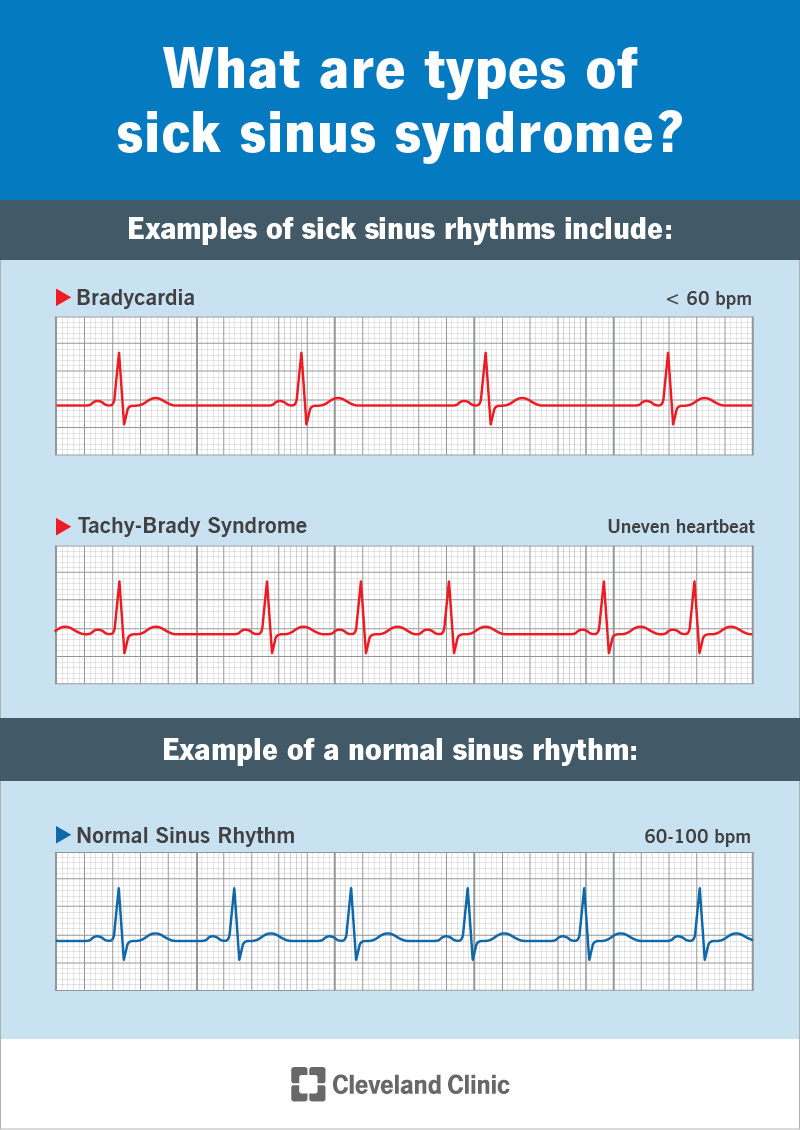Sick sinus syndrome is a problem with your sinoatrial (SA) node. It can make your heart rhythm too slow, too fast or a mixture of both. It may also stop briefly. Some people don’t have symptoms with sick sinus syndrome, but others need a pacemaker to get a normal heart rhythm. This typically affects people over 70 due to aging.
Advertisement
Cleveland Clinic is a non-profit academic medical center. Advertising on our site helps support our mission. We do not endorse non-Cleveland Clinic products or services. Policy

Image content: This image is available to view online.
View image online (https://my.clevelandclinic.org/-/scassets/images/org/health/articles/21789-sick-sinus-syndrome-illustration)
Sick sinus syndrome (sinus node dysfunction) is a heart rhythm condition that happens because your sinoatrial node (SA node) isn’t working right. When this pacemaker-like node can’t keep a steady beat, your heartbeat may be too slow (bradycardia). It can also switch between too fast and too slow (tachy-brady syndrome).
Advertisement
Cleveland Clinic is a non-profit academic medical center. Advertising on our site helps support our mission. We do not endorse non-Cleveland Clinic products or services. Policy
You may also have a sinus pause or arrest. This means your SA node isn’t sending any impulses for at least three seconds. Another part of your heart steps in to send a signal when this happens. But when it doesn’t, you can feel faint or lose consciousness.
Sick sinus syndrome isn’t common. American providers diagnosed 78,000 new cases in 2012 but expect to see 172,000 new cases in 2060.
Often, especially at the start of the disease, people with sick sinus syndrome have no symptoms. If they do have symptoms from a slow or fast heart rate, they include:
SA node dysfunction has several causes. Sometimes, healthcare providers don’t know the cause.
Known causes of sick sinus syndrome include:
Advertisement
You’re more likely to get sick sinus syndrome if you:
Although you can’t control risk factors like your genetics or your age, there are some things you can do to reduce your risk of sinus node dysfunction. You can take care of your heart to prevent heart disease. You can also keep your follow-up appointments for other health conditions that could put you at risk. When you talk with your healthcare provider, ask them if the medicines you take put you at risk.
Other problems that can happen if you have sick sinus syndrome include:
To make a sick sinus syndrome diagnosis, your healthcare provider will do a physical exam and ask about your medical history. They’ll want to make sure you don’t:
Your provider will need to see a definite link between your symptoms and a slow heart rate (bradycardia) to diagnose SA node dysfunction.
Before making a diagnosis, your provider may order one or more of these:
If you don’t have symptoms, you might not need any sick sinus syndrome treatment. If a medication caused the SSS heart problem, your treatment may include a prescription change. Or you may need treatment for an issue a healthcare provider can reverse, like a metabolic condition. Depending on your symptoms, you may need medicine or a pacemaker.
Treatments may include one or more of these:
It may take several days to a week to recover from pacemaker surgery. You should recover completely in about a month.
Contact your provider if you have sick sinus syndrome symptoms or if you have a problem with your pacemaker. Get emergency care if you have fainting spells. You should have follow-up visits with your provider for the long term if you have a pacemaker.
Advertisement
You may want to ask your healthcare provider:
Sick sinus syndrome usually keeps getting worse over many years. But some people never end up with other health issues connected to this condition. A pacemaker can help relieve your symptoms and give you a better quality of life, but it may not extend your life expectancy.
You can be physically active with this condition, but it may be difficult. Once you get a pacemaker, physical activity should be easier.
Sick sinus syndrome is a long-term problem that slowly gets worse.
Getting a pacemaker gives you a great outlook. There’s only a low risk of sudden cardiac death with sick sinus syndrome. Having other heart issues along with sinus node dysfunction can give you a worse prognosis.
To feel your best, you can:
Fainting or having chest pain is a major disruption in your life. The good news is that sick sinus syndrome is treatable. Since an SSS heart problem usually gets worse over many years, checkups matter. It’s important to keep your appointments with your provider. They can catch anything that starts to develop and help you treat it right away.
Advertisement

Sign up for our Health Essentials emails for expert guidance on nutrition, fitness, sleep, skin care and more.
Learn more about the Health Library and our editorial process.
Cleveland Clinic’s health articles are based on evidence-backed information and review by medical professionals to ensure accuracy, reliability and up-to-date clinical standards.
Cleveland Clinic’s health articles are based on evidence-backed information and review by medical professionals to ensure accuracy, reliability and up-to-date clinical standards.
When your heart rhythm is out of sync, the experts at Cleveland Clinic can find out why. We offer personalized care for all types of arrhythmias.
